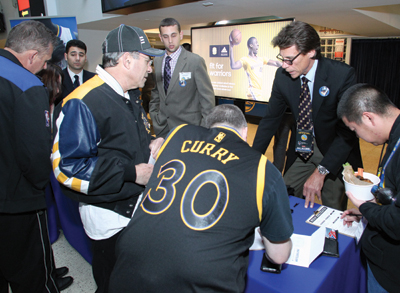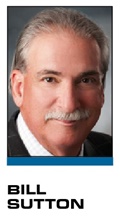During last month’s SportsBusiness Journal ticketing and facilities conference, the discussion on a panel I moderated raised a number of issues and even more questions. I took some of these issues to some of the most respected leaders in the team ticketing space and asked them to respond.
■ A number of teams have been adding to their ticket sales staff and the number of people in these ticket sales departments is now often more than 50 and in once case approaching 100. What is the ideal number of ticket sellers to employ?
SCOTT O’NEIL, CEO, Philadelphia 76ers and New Jersey Devils: The math is simple; the direction the data points you is even simpler. Adding more ticket sellers makes good financial sense for all teams with empty seats and/or those comping more than [1,000] seats per game.
The ROI on ticket sellers is something we track weekly. Our average ROI is 5.1:1 for the year (meaning our reps bring in $5 in revenue for every $1 we spend on salary, commission, benefits and overhead) and 14.3:1 if you take into account renewal percentages over a five-year tail. We have and continue to build large ticket sales staffs and will continue to do so until we are selling out our games.
■ Is there a point where there are diminishing returns? In other words, while the ROI appears to be there, could the same sales results be achieved with a smaller staff possibly creating an even higher ROI with the same total revenue generated by a larger staff?
ROB SINE, vice president, ticketing, Pac-12 Conference: Yes, quality over quantity is the argument to be made here. Having a smaller, highly trained and effective sales staff can lead to larger ROI because often times to build a larger staff you have more [account executives] who don’t fit the exact bill you’re looking for when hiring and are often hired because they are “close” to what you want and you have a staff to build. However, in the long run, those AEs you deemed “close” when hiring can sabotage the rest of the staff if they do not develop at the rate you want, or produce the results you are looking for.
 |
|
The Warriors have commission escalators for its sellers, providing motivation to maximize revenue.
Photo by: GOLDEN STATE WARRIORS
|
BRANDON SCHNEIDER, group vice president, ticket sales and services, Golden State Warriors: There is certainly a point of diminishing marginal returns, but very few teams (if any) have reached it. If you are hiring incremental salespeople who are largely making outbound calls, and they are driving more revenue than they are being compensated, then you have not reached that point. If your existing sales staff is not able to contact every “warm lead” in your database once a month, then you would likely benefit from hiring additional staff (assuming you have inventory to sell). One other factor to consider is that most teams typically only look at the revenue associated with the original sale. Keep in mind that a lot of these sales will result in additional revenue for years to come (lifetime value of the customer).
■ Retaining ticket sales team members, particularly given their higher expected productivity in terms of revenue generation in their second and third years of employment, is a priority in most organizations. What are some industry practices to retain qualified sellers in a ticket sales role, without promoting them to corporate or premium sales?
SCHNEIDER: We have found the key to be structuring our compensation plan to really benefit our top performers. We start with a standard commission rate and have installed three escalators so that each time a salesperson reaches a certain revenue threshold their commission rate increases. The final escalator puts their commission percentage at three times the starting rate. This motivates all of our sellers to maximize revenue as they understand the commission that is at stake, and allows our top performers a huge upside.
We provide our top performers a voice in helping our management group make decisions, so they feel like they are part of the process. We engage them in discussions and solicit their input covering important decisions such as partial-plan makeup and ticket pricing, and by providing them exposure to upper management.
MARC JACKSON, senior director, premium and season-ticket sales, Charlotte Hornets: Often compensation is the default in this argument. This could include but is not limited to increased base pay, heightened commission percentages, etc. Exposure to leadership responsibilities is also helpful with this. Opportunities such as recruiting initiatives, peer development, exposure to luxury/premium inventory, etc. can be messaged as career-advancement programs. Ultimately, restructuring and definitely defining advancement structure from entry-level sales to top of the food chain can alleviate this issue.
LEIGH CASTERGINE, senior vice president, ticket sales and services, New York Mets: Here at the Mets, we know making 60 to 80 calls a day can become mind-numbing. Therefore, we encourage our teams to create events and get more face-to-face appointments. We find the more time they spend building relationships with their prospective clients, the happier they are at their jobs as well as the more money they make both personally and for the organization. Also, we have incorporated leadership opportunities/mentorships for our representatives that have management aspirations. We want them to know that we are focused on their future.
■ Often times during the year I have vacancies in my sales department and have difficulty finding quality applicants to consider. Do you have some recruitment strategies to enable me to build an applicant pool?
JEFF IANELLO, vice president, team marketing and business operations, NBA: The most important asset that we have in a sales and service department are the sellers themselves. If “people” are most important, then the time spent on recruiting as well as training and development needs to reflect that. In recruiting, the hiring manager must ask him or herself a few questions: What do I believe in? What is unique and powerful about working for me and my organization? The answers to these questions will define the types of interview questions to ask a candidate as well as define the story that makes your program a desirable landing spot.
Bill Sutton (wsutton1@usf.edu) is the founding director of the sport and entertainment business management MBA at the University of South Florida and principal of Bill Sutton & Associates. Follow him on Twitter @Sutton_ImpactU.





